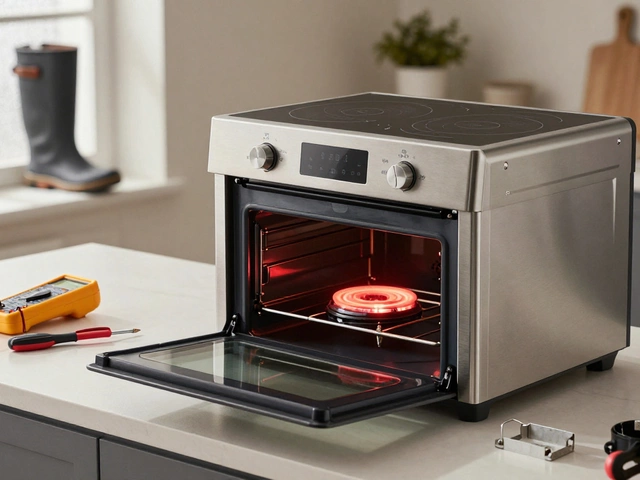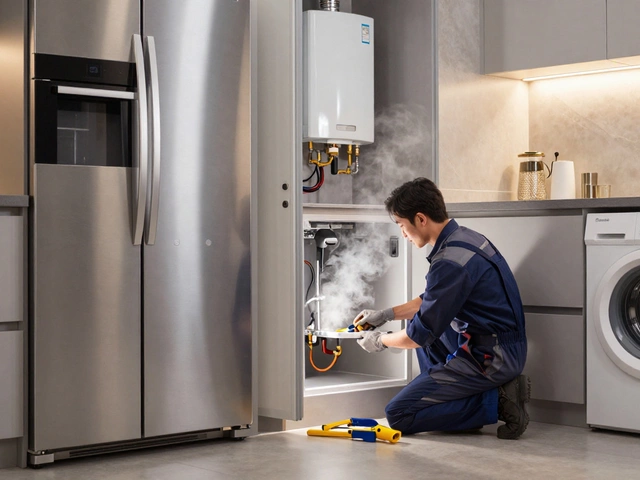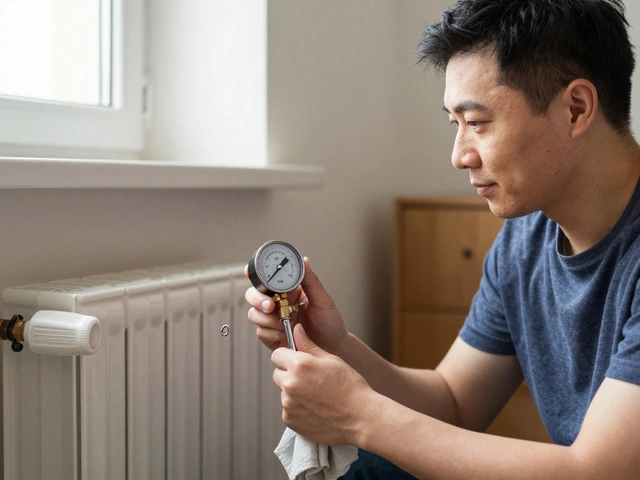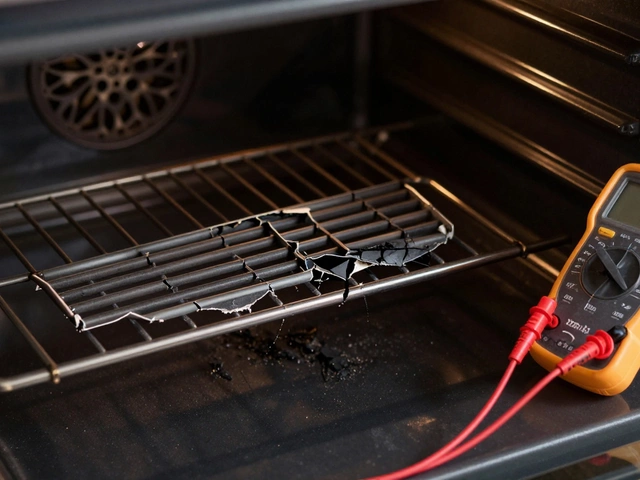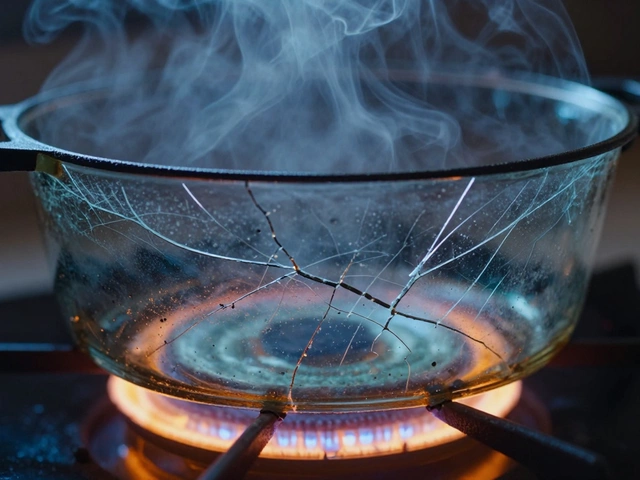One of the worst surprises after a long workday is a cooker that just stops working—right when the family’s hungry. Before you panic or hop online for a new one, take a beat. Sometimes repair is a quick, solid solution—sometimes it’s just throwing money down the drain.
First off, cookers aren’t always cheap or easy to replace, especially if you’ve grown attached to your kitchen routine (or if, like me, you have kids who would definitely notice if dad’s mac and cheese was suddenly made on a different stove). So figuring out whether to repair or replace affects more than just your bank account—it might just mean a week of takeout, too!
Not every cooker issue is the same. Some are as simple as a broken knob or a dodgy heating element—problems that are actually fixable at home for the cost of a part and maybe an hour. But bigger stuff, like serious electrical faults or leaky gas lines, might make you think twice about calling in a pro.
- Spotting Common Cooker Problems
- Repair Costs vs. Replacement
- When Fixing Makes Sense
- When It's Time to Move On
- Money-Saving Tips and Final Thoughts
Spotting Common Cooker Problems
Cookers go wrong in a bunch of familiar ways—some obvious, some sneaky. Knowing what to look for can help you figure out if you need a quick fix, a full cooker repair, or a full-on replacement.
- Not Heating Up or Uneven Cooking: This is usually the one everyone notices first. If your oven struggles to get hot or cooks food unevenly, it’s often down to a burned-out heating element (in electric cookers) or a dodgy thermostat.
- Gas Burner Issues: For gas cookers, a weak flame or burner that won’t light up typically means blocked jets or a faulty ignition switch. Always be extra careful if you ever smell gas—this can be serious, and you should turn off the supply and call in a pro right away.
- Strange Noises: A healthy cooker should be fairly quiet. Clicking, buzzing, or popping sounds could point to loose parts or electrical faults inside the appliance.
- Broken Controls: Knobs or digital panels can stop responding due to worn-out switches, water damage, or even just daily use. Sometimes, swapping a simple part brings everything back to life.
- Door Problems: Oven doors that don’t seal properly mean your cooker is working extra hard (and costing you more on energy). If you see heat escaping or your food takes forever to cook, check the door gasket or hinges.
Don’t forget—sometimes what looks like a cooker issue isn’t the cooker at all. Faulty wall outlets, tripped circuit breakers, or even a blown fuse in the plug can leave the appliance dead. It pays to check the basics before booking a appliance fixing service.
| Common Problem | DIY Fix? | When to Call a Pro |
|---|---|---|
| Heating Element Replacement | Often | If wiring looks damaged |
| Gas Leak | Never | Always |
| Broken Knob | Yes | If panel won’t respond |
| Strange Noises (Electric) | Check for loose screws | Loud popping or smell of burning |
If your cooker won’t power on at all, unplug it and check for a blown fuse in the plug—it’s a common, easy fix that most people overlook. Getting to know these basic cooker problems can save you real money and a lot of frustration down the line.
Repair Costs vs. Replacement
Choosing between cooker repair and buying a new one is all about balancing your wallet and sanity. Repairs can be simple and cheap—or a huge hassle. If you’re looking at a blown fuse or a new heating element, you might end up spending as little as £30-£60 on the fix. But complex jobs, like swapping out control boards or sorting major gas leaks, can shoot up to £150 or more just for labor and parts.
Let’s break it down:
- Quick repairs (like replacing knobs or fixing doors): usually £10-£50.
- Electrical element swaps: £40-£80 with parts and labor.
- Engineered part replacements (circuit boards, main burners): £100-£200.
- Full install on a new mid-range cooker: often £350-£700 (including haul-away costs and installation fees).
If a cooker is out of warranty or more than 7-10 years old, pouring cash into repeated appliance fixing starts losing sense. Another tip: if the cost to fix it creeps up to about half the price of a new one, you’re usually better off switching to fresh gear rather than risking more breakdowns next month.
| Repair Type | Estimated Cost (£) |
|---|---|
| Minor Repairs | 10 - 50 |
| Heating Element | 40 - 80 |
| Control Board/Main Burner | 100 - 200 |
| New Cooker (with setup) | 350 - 700+ |
Replacement starts making a lot of sense when your repair costs go north of £200, or if major parts are fried. Sometimes, warranties or extended service plans cover repairs, so double-check your paperwork before shelling out cash. Most big brands run the same numbers: after a certain point, repairs aren’t worth it, and a new kitchen maintenance investment pays off over the long run.

When Fixing Makes Sense
Let’s get practical: fixing a cooker is usually worth it when a repair costs less than half the price of buying a new one. If your cooker’s not ancient—that means under eight years old—it’s got plenty of life left. Most modern cookers are built to last around 10-15 years. If yours is still in that range, and you’re not dealing with anything catastrophic (like a fried wiring harness or a cracked frame), you might want to keep it.
Some repairs are so simple they barely count as work. Swapping out worn-out knobs, shelves, or oven seals only takes a bit of time and basic tools. Even replacing a busted heating element or fixing an igniter is totally doable. Those parts are cheap and won’t rack up a huge bill unless you’re paying top rates for a repair tech.
- Minor fixes, minor costs: Replacing knobs: £10-£20. New oven seals: £20-£30. Heating elements: £30-£60. Even with a service fee, fixing these is cheaper than a new cooker.
- Still under warranty? Always check—lots of cookers have longer warranties on key parts, even after the main warranty expires.
- Energy savings: If your cooker is energy A-rated or better and it’s only a few years old, repairing it means you hang onto those savings longer.
Here’s a handy look at the rough repair costs versus the cost to replace:
| Repair Type | Average Cost (£) | New Cooker (£) |
|---|---|---|
| Heating Element | 50 - 100 | 350 - 800+ |
| Igniter | 60 - 110 | 350 - 800+ |
| Control Knob | 10 - 20 | 350 - 800+ |
So if the bill is reasonable and your cooker hasn’t turned into a vintage collectible, repairing really does make sense. I’ve saved a few hundred quid myself by handling these fixes before even thinking of replacing. Plus, it keeps your kitchen routine ticking without weeks of chaos or extra costs.
When It's Time to Move On
Sometimes, no matter how much you want to hang onto your old cooker, it just isn’t worth it. If your cooker repair cost is over half the price of buying a new one, it’s usually smarter to stop pouring money into it. Most cookers last about 10 to 15 years; after that, even a quick fix can start a cycle of constant breakdowns. If your appliance is already at that age or older, think hard about saying goodbye.
If you notice your cooker is showing some of these signs, it’s probably time:
- Repairs keep stacking up—think of it like that one friend who always needs a ride somewhere. More trouble than it’s worth.
- The heat isn’t even—one burner is too hot, another too cold. You end up burning dinner... a lot.
- You smell gas or see scorch marks. Yep, that’s a serious safety issue—no joke here, that can be dangerous for your kitchen and the folks in it.
- The control panel or buttons are dead even after trying simple fixes.
- Replacement parts are hard to find or cost a fortune. Some older models just aren’t supported anymore, so even pros struggle to fix them.
Here’s a quick cheat sheet to help you decide when it’s time to move on. Nothing fancy—just some numbers I gathered from local repair shops and recent UK appliance surveys:
| Cooker Age (Years) | Avg. Annual Repair Cost (£) | Chance of Major Fault Next Year |
|---|---|---|
| 5 | 30 | 8% |
| 10 | 65 | 17% |
| 15+ | 120+ | 40% |
So if you're staring at a 12-year-old cooker that needs another expensive cooker repair just to limp along, it's probably best to cut your losses and invest in something new. New cookers often mean lower running costs, better safety, and less stress when making dinner for the family. If you’re on the fence, check if any utility companies or local councils offer recycling or upgrade deals. Sometimes you can score a sweet discount on a replacement that way.

Money-Saving Tips and Final Thoughts
Let’s be real: cooker repair isn’t always cheap, but there’s no point shelling out for a new appliance if you don’t have to. Before you reach for your wallet, there are a few solid ways to keep costs in check and make a smart decision.
- DIY First: Check for easy fixes. Sometimes, issues like a loose knob or a broken heating element are easy to swap out with replacement parts you can order online. Sites like YouTube are packed with short how-to videos.
- Compare Repair Quotes: Don’t just call one repair service. Get at least two quotes for any job. Prices can swing a lot depending on the company.
- Know Your Warranty: Sometimes your cooker is still under warranty—and you’d be shocked how many people miss out because they forgot to check. If you have the receipt, it’s worth the five minutes to dig it up. Some repairs might cost you nothing.
- Use Local Repair Shops: Local repair people often charge less and can be more flexible with timing than bigger chains.
- Watch Out for Hidden Fees: Always ask repair shops about call-out charges, minimum labor fees, and the cost of parts before saying yes.
If you’re still torn, consider this breakdown of average costs for cooker repair versus replacement:
| Service | Average Cost (GBP) |
|---|---|
| Simple part replacement (knob, seal) | £15 - £40 |
| Heating element repair | £50 - £100 |
| Control board replacement | £110 - £180 |
| New mid-range cooker | £300 - £700 |
This table shows the jump in price if you go for a new appliance versus basic fixes. If you just need a cooker repair for a simple issue, you’ll usually come out way ahead. Even mid-level repairs often cost less than half of a new unit.
In my house, the cooker is a workhorse—whether it's roast chicken Sunday or Lena's favorite brownies. The trick is knowing when it’s worth the hassle to call a repair tech and when it’s time to invest in something new. Stick to practical fixes, check those warranties, and always get a second opinion before you toss out your cooker. Your wallet (and your dinner plans) will thank you.




